Mastering the Art of Barbecue Grill Cleaning
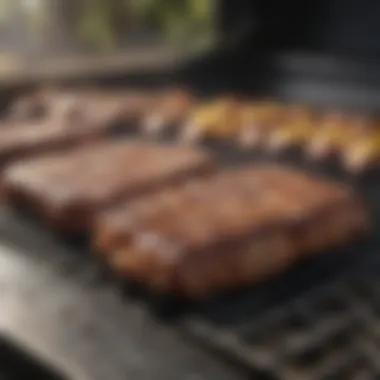
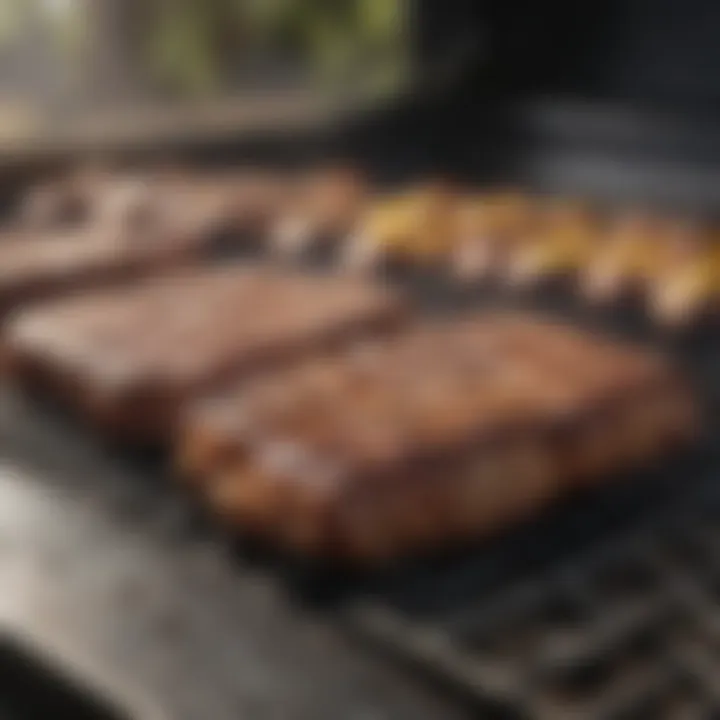
Intro
Cleaning your barbecue grill is more than just a matter of appearance. It ensures the longevity of your grill and maintains food safety. Each type of grill—whether a charcoal, gas, or electric—has its own nuances and needs when it comes to cleaning. Moreover, tools and techniques vary, which can affect not only the cleaning efficacy but also the flavor of the food prepared afterwards.
A well-maintained grill enhances your culinary experience and reduces the risk of cross-contamination. This guide aims to equip readers with comprehensive cleaning methods, essential tools, and maintenance tips. By following this guide, readers will not only clear away grease and residue but also ensure that their next grilling session is enjoyable and safe.
Intro to Grill Maintenance
Grill maintenance plays a crucial role in ensuring a safe cooking environment and prolonging the life of the equipment. Regular cleaning minimizes the risk of flare-ups that can lead to accidents and enhances the flavor of food. When residue from previous cooking sessions builds up, it can impart unpleasant tastes and odors to new dishes.
Furthermore, maintaining a clean grill fosters better hygiene, which is particularly important when cooking for family and friends. A neglected grill can harbor bacteria and other contaminants that pose health risks. By focusing on grill maintenance, cooks can elevate their barbecuing experience. This article explores various aspects of grill cleaning and maintenance, emphasizing its significance.
Importance of Regular Cleaning
Regular cleaning goes beyond aesthetic appeal. It prevents the buildup of grease and food particles, which can ignite dangerous flames during cooking. Cleaning also ensures even heat distribution, which is essential for properly cooked food. In addition, grime can inhibit the efficiency of your grill, causing more gas or charcoal to be used.
Maintaining a clean grill saves time and resources in the long run. A clean surface is easier to manage and less likely to cause unwanted issues during grilling.
Understanding Grill Types
Grill types affect cleaning techniques and maintenance strategies. Different grills have unique features that dictate how often and what methods should be used to clean them.
Charcoal Grills
Charcoal grills are popular for their ability to impart rich, smoky flavors to food. They typically require a more manual approach to cleaning because ash buildup can interfere with airflow and cooking performance.
These grills consist of a simple design that is effective and easy to maintain, though they demand a bit of patience and effort during the cleaning process. The unique aspect of charcoal grills is the need to remove ashes regularly to sustain optimal burning efficiency. However, their lack of advanced technology means that they are often favored for a traditional grilling experience, despite requiring more cleanup.
Gas Grills
Gas grills appeal to many cooks for their convenience and speed. They heat up quickly and offer precise temperature control, making them a preferred choice for those who grill frequently.
Gas grills generally feature multiple burners, which require thorough inspection and cleaning to ensure proper function. Their design facilitates easier cleanup compared to charcoal, yet they still need routine maintenance to remove grease and food debris from the burners and grates. The efficient nature of gas grills can encourage overconfidence in maintenance, which can lead to neglect if not attended to regularly.
Electric Grills
Electric grills provide a different kind of versatility and are often used indoors, making them a solid option for those with limited outdoor space. They are easy to operate and require less hands-on attention than a charcoal grill.
The simpler components of electric grills enable easier cleaning, as many models come with removable parts and non-stick surfaces. However, it’s essential to consider that while they save time, the cleaning routine must be consistent to avoid build-up on the heating elements. Their unique attributes make them beneficial for both novice and experienced cooks, but they also require attention to ensure longevity.
Necessary Cleaning Tools and Supplies
Cleaning your barbecue grill effectively relies on the right tools and supplies. Without them, the cleaning process can become cumbersome and less effective. Each tool plays a specific role in ensuring that the grill remains hygienic, functional, and safe for food preparation. Understanding the variety of tools available allows individuals to approach grill maintenance more confidently.
Essential Tools
Grill Brush
A grill brush is perhaps the most essential tool for cleaning a barbecue grill. Its primary function is to remove food residues and grease from the grill grates. A key characteristic of a grill brush is its bristle design, typically made from stainless steel or brass. This allows for effective cleaning without scratching the grill surface.
One of the beneficial aspects of using a grill brush is its ability to reach between the grates and remove stubborn residues. However, it's important to choose a brush with sturdy bristles to avoid shedding during use, which can lead to potential hazards if consumed.
The unique feature of some grill brushes includes a scraper on the opposite end, enhancing functionality. The downside may lie in the wear and tear of bristles over time; replacing them regularly is necessary for successful cleaning.
Scraper
The scraper is another important tool for maintaining your grill. Its flat, rigid surface allows for removing hardened, stuck-on debris that a brush might miss. Scrapers can be made of metal or plastic, with metal options being sturdier and more effective for heavy-duty cleaning tasks.
A notable belief surrounding scrapers is that they do not harm the grill’s cooking surface, especially when using plastic versions. The choice of a scraper is favorable for those who want to ensure every inch of their grill is cleaned.
Nonetheless, care should be taken to use scrapers correctly, as excessive force could damage the surface of the grill. Also, regular use might wear down the scraper faster than expected.
Cloth
Cloths are versatile tools in the grill cleaning process, primarily used for drying surfaces and wiping down areas after scrubbing. A good cloth should be absorbent and durable, making cotton or microfiber options preferred choices.

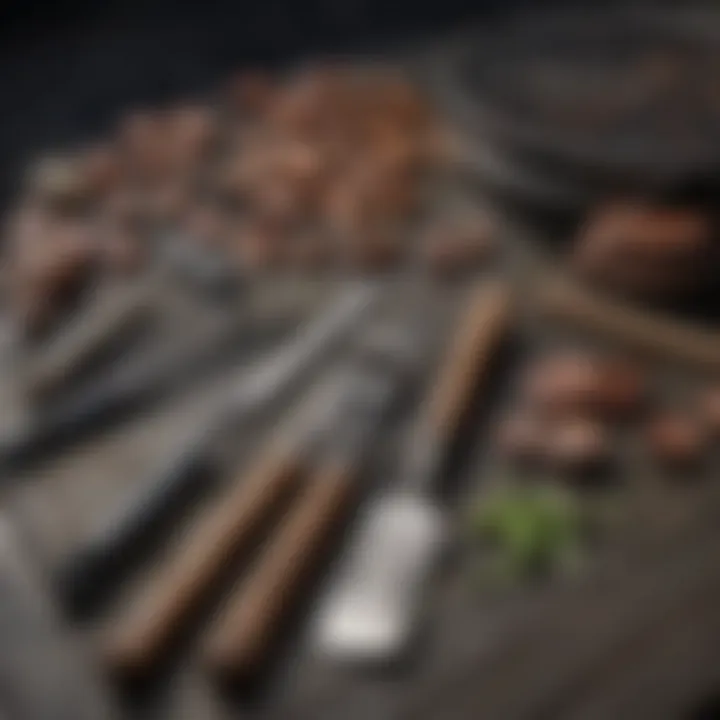
Cloths are beneficial for reaching areas like control knobs and the exterior of the grill where grime can accumulate. They do not scratch surfaces, ensuring that your grill remains unblemished after cleaning.
However, cloths need to be cleaned or replaced often, as they can quickly collect grease and odors if not maintained. This needs to be considered to maintain hygiene effectively while cleaning.
Cleaning Agents
Cleaning agents are crucial for achieving a thorough clean. They help break down grease and other residues that tools alone may not tackle effectively.
Commercial Cleaners
Commercial cleaners are designed specifically for grills and often contain enzymes that effectively dissolve grease and burnt food. The main advantage is their targeted action, offering quick results with minimal scrubbing. Many grill enthusiasts prefer these products because of their convenience.
However, some may contain harsh chemicals that could pose risks to food safety if not rinsed thoroughly. Therefore, it is vital to follow the manufacturer's instructions when using commercial cleaners.
Natural Alternatives
Natural alternatives include common household items like vinegar, baking soda, and lemon juice. These options are eco-friendly and often just as effective at cutting through grease. Natural cleaning agents are ideal for those concerned about chemical exposure, especially when grilling.
The advantage lies in their safety and accessibility. However, they may require more manual effort or time to achieve a thorough clean compared to commercial products.
Each tool and cleaning agent serves particular functions that enhance the overall cleaning process, contributing to a grill's longevity and safe use.
Step-by-Step Cleaning Process for Different Grill Types
A systematic cleaning process is crucial for maintaining the performance and longevity of any barbecue grill. Each type of grill requires unique attention, ensuring that the methods applied not only clean but also preserve essential components. Engaging with these methods taps into the overall goal of ensuring a safe and enjoyable grilling experience.
Cleaning Charcoal Grills
Removing Ashes
Removing ashes from a charcoal grill is an essential task that significantly impacts its operation. Ash buildup can obstruct airflow, making it more difficult to maintain the desired temperature during cooking. Consequently, this can lead to unevenly cooked food. The key feature is the nature of charcoal residue, which can accumulate rapidly after grilling sessions. Regularly clearing out ashes not only improves airflow but also decreases the risk of ash being drawn into your food. This practice is both beneficial and vital for anyone who regularly indulges in charcoal grilling.
Brushing Grates
Brushing the grates of a charcoal grill ensures the removal of food particles and grease that can accumulate over time. This process directly contributes to hygiene and enhances the flavor of the grilled food. The main characteristic of brushing the grates is its ability to maintain the grill's surface condition, as buildup can cause flare-ups or unwanted smoke. The unique aspect is the choice of brush; using a brass or stainless steel brush is often recommended to prevent damage. While brushing does require consistent effort, its advantages include improved food taste and reduced chances of potential fire hazards.
Final Wipe Down
The final wipe down is a critical step after the main cleaning efforts. This task involves using a damp cloth to remove any residual ashes or grease that were dislodged during the cleaning process. The key principle is that maintaining a clean appearance supports greater cleanliness standards during the next grilling session. The unique feature of a final wipe down is its simplicity. It is recommended for maintaining the aesthetic of the grill. Although this may seem like a trivial step, neglecting it can lead to grimy surfaces over time, which can discourage use.
Cleaning Gas Grills
Turning Off the Gas
Before undertaking the cleaning of a gas grill, it is paramount to ensure the gas supply is securely turned off. This procedure is crucial not only for safety but also sets the stage for effective cleaning. The essential characteristic here is the avoidance of potential hazards like gas leaks or accidental ignition. By prioritizing this step, one is safeguarding themselves and the environment. This choice is especially significant for those who might rush into cleaning without considering safety protocols, hence adds an essential layer of precaution to the process.
Cleaning Burner Protectors
Cleaning burner protectors is another aspect that aids in effective grilling. Over time, these protectors accumulate grease and debris, which can hinder the grill's efficiency. The main reason for cleaning them is to ensure uniform heat distribution during cooking, allowing food to be cooked evenly. This task is favored because keeping burner protectors clear reduces the risk of flare-ups, which can burn food or create unwelcome smoke. The consideration of time-intensive cleaning here points to its unique feature: a direct link to the quality of your grilling results.
Inspecting Burners
Inspecting the burners is a fundamental part of gas grill maintenance. During inspections, one should look for clogs, corrosion, or any other impairments. The critical aspect of this step is recognizing that maintenance can prevent costly repairs or replacement in the long run. This unique focus on the condition of burners adds another layer to the cleaning process, making it not only a task of cleanliness but also one of ensuring functionally safe operation. While it may require time and patience, neglecting this step can lead to disappointing grilling experiences.
Cleaning Electric Grills
Disassembling Components
Disassembling components of an electric grill is essential for an in-depth cleaning process. This method allows for comprehensive access to various parts that are often hard to reach. The primary advantage here is the ability to clean every nook and cranny. This choice is very beneficial as it promotes ultimately better hygiene and performance of the grill when reassembled. However, it is important to be cautious during this step to avoid misplacing parts or damaging components, thus requiring a bit of time and careful attention.
Soaking Removable Parts
Soaking removable parts in hot soapy water is a simple yet effective cleaning method for electric grills. This technique helps dissolve grease and food residues, making it easier when scrubbing them afterward. The unique aspect of soaking is its ability to significantly reduce the physical effort required to clean tough stains. While soaking provides ease, it may not be suitable for all grill components, so care must be taken to know what can be soaked without risk of damage.
Wiping the Surface
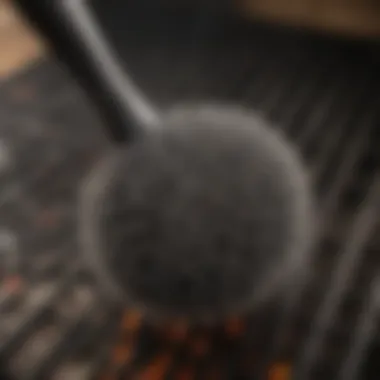
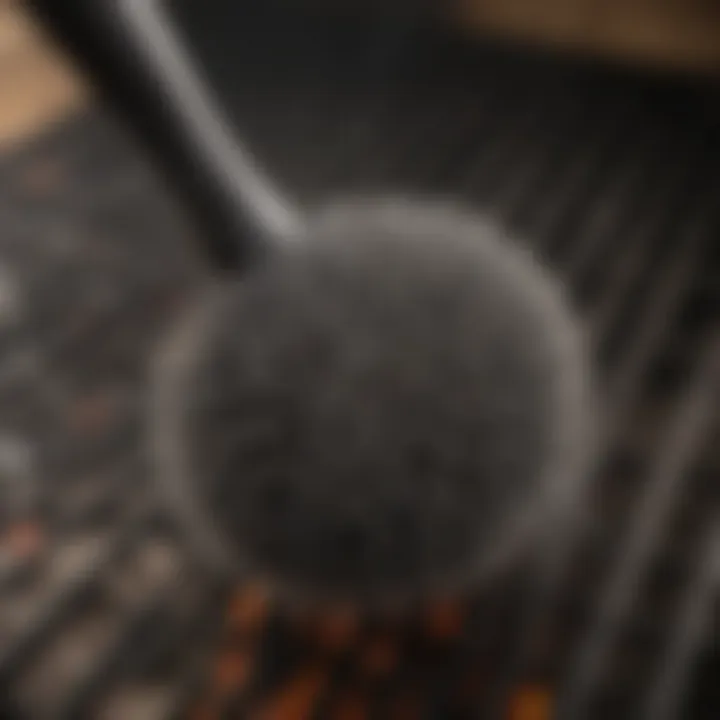
Wiping the surface is a straightforward yet essential cleaning step for electric grills. A clean surface prevents cross-contamination and supports better cooking outcomes. The key feature of this step is that it can be performed regularly, helping in the upkeep of overall hygiene. The unique feature lies in the frequency; regular wiping can quickly become part of a routine, allowing for easy maintenance. While it may seem minor, neglecting it can lead to build-up that becomes increasingly harder to manage over time.
Seasonal Grill Maintenance Recommendations
Seasonal grill maintenance is a critical aspect of ensuring your barbecue grill operates effectively throughout the cooking seasons. This section highlights strategies that both enhance performance and prolong the lifespan of your grill. By following seasonal recommendations, grill owners can avoid major issues that stem from neglect. Key elements of this maintenance include checking for damages and implementing deep cleaning processes, both at the start and end of the grilling season. A few moments spent each season can lead to a more pleasurable and worry-free grilling experience.
Pre-Season Maintenance
Inspecting for Damage
Inspecting for damage is an essential step before starting the grilling season. This phase serves to identify any wear before it impacts functionality. One common characteristic to watch for includes rust formation, which can affect the grill's performance. Additionally, cracks or breaks in components like the grates or burners can lead to inefficiencies. Regular inspections can prevent small issues from escalating into significant problems later.
The benefit of inspecting for damage is that it establishes a base for a safe grilling environment. Ignoring potential issues could lead to accidents or costly repairs. One unique feature of this process is that it encourages grill owners to familiarize themselves with the inner workings of their grill. Understanding the components helps in recognizing when something may be off. This approach can save time and money in the long run.
Deep Cleaning
Deep cleaning plays a crucial role in maintaining your grill's performance. This process involves thorough cleansing of all surfaces, including grates and internal components. By removing built-up grease and food residues, deep cleaning ensures a hygienic cooking environment. This cleaning not only enhances the flavor of your grilled food but also reduces smoke and flare-up incidents.
The integral characteristic of deep cleaning is its capability to restore your grill. Each season, grease accumulates, and ignoring it could affect your grill's operation. The unique aspect of this cleaning method is the opportunity to examine the grill thoroughly. While beneficial, it requires a time investment and proper cleaning agents. Therefore, planning ahead for this task can yield the best results and simplify the process.
Post-Season Maintenance
Cleaning Before Storage
Cleaning before storage is vital for preserving the integrity of your grill. After a season of use, collecting residue can cause problems if left unattended. This cleaning step contributes to extending the life of the grill and ensuring that it is ready for use during the next season. One highlight of this practice is that it reduces the likelihood of pests nesting in leftover food remnants.
The unique feature of cleaning before storage is its multitasking benefit; it allows grill owners to assess the state of their grill while preparing it for its off-season. This practice enables a seamless transition into the next grilling season and ensures that you will not face unexpected challenges when reusing your grill.
Protection Techniques
Protection techniques are a necessary component of post-season grill maintenance. These techniques involve using grill covers and storing your grill in sheltered areas. By covering your grill, you significantly reduce exposure to harsh weather elements, which can lead to rust and deterioration.
The key characteristic of protection methods lies in their preventive nature. They actively shield your equipment from damage. A unique advantage of implementing these techniques is the enhanced readiness of your grill when you decide to fire it up again. However, the disadvantage may include the additional costs of proper covers. Overall, the benefits of protecting your grill far outweigh the drawbacks, ensuring it remains in prime condition.
"A well-maintained grill makes grilling more enjoyable, contributing to better meals and fewer headaches."
By systematically following these seasonal maintenance recommendations, grill owners can ensure prolonged equipment efficiency and safety. This diligence will result in not just longer-lasting equipment but also an overall enhancement in the quality of your grilling experience.
Preventative Measures for Better Maintenance
Regular maintenance is key to prolonging the life and effectiveness of your barbecue grill. Implementing preventative measures can help avoid extensive cleaning efforts and repairs down the line. Understanding how to take care of your grill will ensure that it remains in optimal condition, providing enjoyable cooking experiences for years to come. This section will focus on two crucial preventative measures: using grill covers and conducting regular interval cleaning.
Using Grill Covers
Using a grill cover is one simple yet effective measure to protect your barbecue from the elements. A suitable cover acts as a barrier against rain, snow, and dust. It will prevent rust formation and minimize the amount of grease or debris accumulating on the grill surface. A cover keeps the grill in good condition, reducing the frequency of deep cleanings.
When choosing a grill cover, ensure it fits snugly over your specific grill type. Look for covers made of durable, weather-resistant materials. Avoid low-quality options as they may not provide the expected protection. Proper care of the grill cover itself is essential, so it's vital to clean it regularly and check for wear and tear over time.
Regular Interval Cleaning
Establishing a routine for cleaning your grill can make a significant difference in its maintenance. Regular interval cleaning helps manage grease buildup and keeps food residues at bay. A few minutes spent cleaning after each use can greatly reduce the need for extensive cleanings. This practice also contributes to food safety and hygiene, which is critical when preparing meals for yourself or others.
Consider implementing a cleaning schedule based on your grilling frequency. For example, if you grill often, cleaning the grates after every use and doing a deeper clean weekly might be appropriate. During each cleaning session, focus on specific areas such as the grill grates, the grease trap, and any other accessible components.
Using tools like a grill brush or scraper can help maintain cleanliness effectively. In addition to standard cleaning, inspect the grill for signs of wear or damage regularly. Addressing any issues early can save you from costly repairs or replacements in the future.
By incorporating these preventative measures into your routine, you enhance the durability and performance of your grill while enjoying a more streamlined cooking experience.
Troubleshooting Common Grill Cleaning Issues
Addressing common cleaning issues is vital for maintaining a barbecue grill. Grills are exposed to various cooking residues, and understanding how to handle these challenges can significantly improve cleaning efficiency and grill longevity. Focusing on specific concerns helps eliminate problems before they escalate, preserves equipment, and enhances the overall grilling experience.
Stubborn Grease Buildup
Stubborn grease buildup can be a major hindrance to successful grill maintenance. If left unattended, grease not only affects flavor but may also lead to fire hazards. Therefore, resolving this issue efficiently is crucial for both safety and cooking quality.
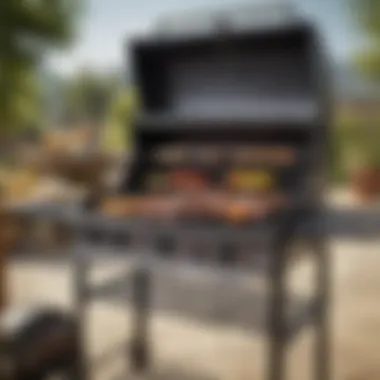
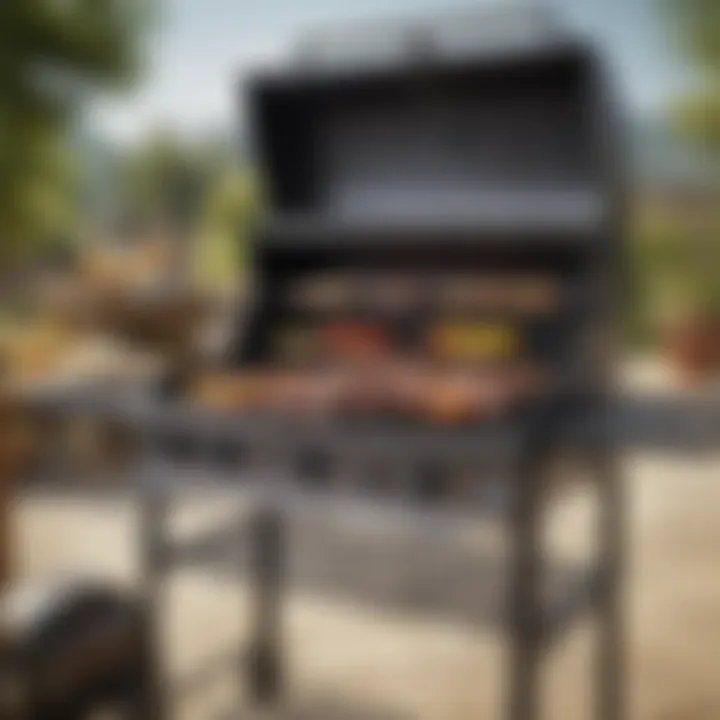
Recommended Solutions
Effective solutions for stubborn grease include specialized grill cleaners and degreasers, which have formulations designed to break down heavy residues. These products penetrate the grease, making it easier to remove. Many of them use non-toxic ingredients, making them a safer choice for families.
One of the standout features of these solutions is their ability to work even on extremely baked-on grease, significantly reducing scrubbing time. They can save users from excessive physical effort and frustration. However, some products may require longer application times to maximize effectiveness, so planning for proper dwell time is advisable.
Time Management Tips
Time management is key when tackling grill cleaning tasks. Setting specific time limits for each cleaning stage can prevent the process from dragging on. For example, spending ten minutes to spray cleaner and let it sit while preparing the grill for the next use can be a good practice.
A significant advantage of structured time management is its impact on efficiency. By recognizing when to engage with stubborn grease, users can allocate their efforts better and not feel drained. However, consistently adhering to these time limits may require discipline, especially when dealing with unforeseen circumstances.
Rust Formation
Rust formation is another concern that needs addressing. This issue affects metal parts and can lead to serious deterioration. Understanding the causes and preventive measures can keep a grill functional for longer periods.
Causes of Rust
Rust occurs due to a combination of moisture and oxygen, often exacerbated by improper storage or a lack of regular cleaning. If moisture from rain or humidity is trapped on metal surfaces, it can initiate rust formation. Neglecting to clean salt or food residues that hold moisture can also accelerate this process.
The primary focus of understanding rust causes is to make informed decisions about maintenance and cleaning schedules. Recognizing these causes enables users to take proactive steps that prevent rust, saving time and expenses in replacements.
Preventative Steps
Taking preventative measures is essential to combat rust effectively. For instance, applying a protective grill cover when not in use is a straightforward yet effective step. Additionally, ensuring that the grill is thoroughly clean and dry prevents moisture accumulation.
A unique aspect of these preventative steps is their simplicity. They do not require expensive products or significant effort. Over time, regular care can substantially reduce the chances of rust formation. However, inconsistent application of these methods may diminish their effectiveness, stressing the importance of commitment to the maintenance routine.
Regular maintenance is not just about cleaning; it's about preserving your investment while ensuring safe and enjoyable grilling experiences.
Best Practices for Maintaining Grill Longevity
Grill longevity is critical for households that rely on outdoor cooking. Well-maintained grills not only enhance food quality but also ensure safety during use. Regular upkeep prevents costly repairs and replacements while providing a better grilling experience over time. Understanding best practices is essential to maximize your grill's lifespan and efficiency.
Storing the Grill Effectively
Proper storage of your grill is vital for its longevity. Here are some key points to consider:
- Location: Choose a dry, sheltered area away from the elements. Wet conditions can lead to rust and deterioration.
- Covering: Use a heavy-duty grill cover to protect it from rain, snow, and sun exposure. A well-fitted cover reduces the chance of dirt and debris intrusion.
- Surface Cleanliness: Before storing, ensure that the grill is clean. Any leftover food or grease can attract pests or encourage mold growth. A simple wipe-down after each use can avoid future issues.
These practices can vastly extend the useful life of the grill. A covered, clean grill is less prone to damage and requires less intensive cleaning sessions.
Routine Safety Checks
Conducting routine safety checks is another integral part of maintenance. These checks ensure that the grill operates safely and efficiently every time you use it. Consider the following:
- Inspect Hoses: Regularly check for cracks or leaks in gas hoses if you are using a gas grill. Any visual signs may indicate a need for replacement.
- Clean Burners: Ensure that the burners are clear of debris. A clog can lead to uneven cooking or dangerous flare-ups.
- Check Connections: Ensure that all connections are secure. Loose connections can lead to gas leaks, which are safety hazards.
Regular checks not only enhance safety but also keep the grill performing at peak efficiency.
By following these best practices for storing and conducting routine safety checks, you will maintain the functionality and safety of your barbecue grill. These efforts will promote a consistent and enjoyable grilling experience, essential for both everyday cooking and special occasions.
Closure
In any guide focused on grill maintenance, the conclusion serves as a critical component. This section synthesizes the insights presented throughout the article and emphasizes the need for ongoing care. Properly maintaining a barbecue grill cannot be understated, as it directly influences its performance and longevity. A cleaner grill not only ensures better taste but also enhances safety during usage.
Regular cleaning cultivates a more enjoyable cooking experience. It minimizes the risk of flare-ups and reduces the chance of transferring unwanted flavors to your food. Furthermore, understanding the specific cleaning processes for different grill types enhances this maintenance.
Considerations about the cleaning process go beyond just aesthetics. They involve hygiene, food safety, and preservation of materials. Grills that are neglected can become breeding grounds for bacteria and may deteriorate quickly.
"A well-maintained grill is an investment in culinary excellence."
Recap of Key Points
- The necessity of regular cleaning to maintain a safe and hygienic cooking environment.
- Different types of grills require specific cleaning approaches.
- Essential tools and supplies aid in achieving optimal cleanliness.
- Seasonal recommendations add value for long-term grill care.
- Preventative measures help in minimizing future cleaning efforts.
- Troubleshooting guides assist in dealing with stubborn issues.
- Best practices extend the life of your grill effectively.
This summary reinforces essential practices and encourages readers to remember these elements as they implement their grill cleaning routines.
Encouragement for Consistent Cleaning Habits
Developing consistent cleaning habits is crucial for every cook and food lover. Set a routine tailored to your grilling frequency. For those who grill regularly, making cleaning a part of the grilling cycle becomes a natural habit.
Establish a simple checklist post-cooking. This could begin just by wiping down the grill grates after usage. With time, these habits can evolve into complete maintenance routines. This consistent care not only ensures better food results but also reduces the effort needed for extensive cleanings.







